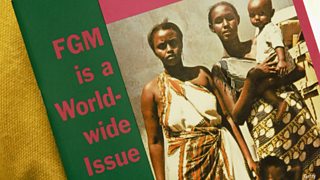FGM: Making a voice heard
Akwumaba Esther Adaji
Reporter for Talk Your Own - Make Naija Better

A woman holds a strategy document
Reporter, Akwumaba describes how deeply she was affected after interviewing a woman who had experienced female genital mutilation aged seven, and how radio has helped her shared her story.
“I saw these huge women – one of them was on my left thigh and one on my right… Then I saw razor blades… It was when I started feeling some pain that I started to scream.”
Otuba Okpokam Osim is telling me about her harrowing experience undergoing female genital mutilation - also known as FGM or by some as female circumcision - when she was seven years old.
Now fifty-two, she'd agreed to be interviewed for the weekly radio programme T. The weekly radio show, broadcasting on over 120 radio stations across the country, is a platform for Nigerians to learn about, discuss and debate issues impacting their lives.
Haunting
Visibly upset, Otuba asks for a moment to gather herself. Forty-five years after it happened, the experience still haunts her.
A young Nigerian woman myself, this is the first time I’ve talked to anyone who has undergone female genital mutilation. It’s a sensitive issue in our country – even though FGM was officially banned by the Nigerian government last year, it’s still seen as a norm in some parts of the country.
FGM is not just a Nigerian issue, of course. It’s estimated that 125 million girls and women are living with the effects of FGM in the 29 countries in Africa and Middle East where the practice is concentrated.
While conducting my research for the radio piece, I was at times overwhelmed learning about the trauma young girls experience during FGM. The World Health Organization describes FGM as “comprising all procedures that involve partial or total removal of the external female genitalia or other injury to the female genital organs for non-medical reasons.” As a woman, it can be difficult even to read and talk about the issue.
Liberating
But for Otuba, it’s important to share her experiences on a platform like Talk Your Own which reaches so many Nigerians. “Talking to you about this,” she says, “I feel pained but I also feel as if I have off-loaded a heavy burden from my chest.” It’s liberating, but more importantly for her, she hopes her story will help spur fellow Nigerians to have a wider discussion of genital mutilation and the impact it has on women’s lives.
As for me, I’m proud to work on a programme that helps Nigerians discuss and debate sensitive topics like this. As the name of the programme suggests, my county benefits when people’s voices are heard.
Related links
Follow us on , and
